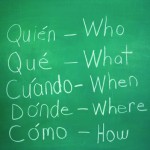Why “younger” is not always “better” in foreign language learning
T his post was contributed by Professor Jean-Marc Dewaele of Birkbeck’s Department of Applied Linguistics and Communications.
his post was contributed by Professor Jean-Marc Dewaele of Birkbeck’s Department of Applied Linguistics and Communications.
 his post was contributed by Professor Jean-Marc Dewaele of Birkbeck’s Department of Applied Linguistics and Communications.
his post was contributed by Professor Jean-Marc Dewaele of Birkbeck’s Department of Applied Linguistics and Communications.
Politicians can be forgiven for not having much time to read the fine print when asking advisers to translate research findings into workable policies. Or does it work the other way round? Do politicians decide on policies first and subsequently ask advisers for appropriate research findings to back up the policy? This seems the case when considering the wide consensus across the world about the benefits of early introduction of foreign languages (FLs) in pupils’ school curriculum. The expression “younger is better” in education sounds perfectly plausible, is simple and convincing, and must be a vote winner.
In the UK, FLs used to be introduced in secondary education. Estelle Morris, then Secretary of State for Education, changed this policy in 2002, scrapping compulsory modern FLs for 14- to 16-year-olds, and introducing them in primary schools. She claimed in 2006 that: “Starting at a much younger age is the best way of making sure we get more pupils taking exams and, more importantly, more of them enjoying and feeling confident about speaking a language other than their own”.
In other countries, FL teaching has even been introduced in nursery schools. There seems to be a universal consensus among politicians that an early start in FLs will lead to a smoother, quasi-effortless learning process leading to high levels of proficiency in the FLs. Is this a myth?!

Counter-intuitively, research suggests that adolescents and adults progress more quickly than children when learning FLs in a school context (so-called “instructed FL learning”). Many researchers have serious doubts about age of onset being the most important variable in successful FL learning. Indeed, research shows quite clearly that starting age is only one of many independent variables in very complex question.
A crucial distinction exists between so-called naturalisticand instructed FL learning. Research on naturalistic learners, typically immigrants, shows that younger children are indeed more likely to become undistinguishable from native speakers of the FL compared to their parents and older siblings. However, the picture is not so clear in research on instructed FL learning, a crucial distinction that is commonly overlooked.
A large-scale study in Barcelona has shown that no differences existed among 30 year-olds who had started learning English at school early (age 8) and those who started later (age 11). However, the amount of input in the FL played an important role: those who had studied English for longer, had used the language more frequently in and out of school outperformed those who had had less input.
Another study found no advantages of an early start among Swiss learners of English even after a five years of instruction. The writing skills of late starters caught up with those of the early starters within six months. One possible explanation is that older learners have greater metalinguistic, metacognitive and strategic skills.
This does not mean that there are no age effects at all in learning and later use of the FLs. Indeed, younger children seem to be more motivated in learning FLs. In my own research on language choice and self-perceived proficiency among more than 1500 adult bi- and multilinguals, I found that early starters in a FL felt more proficient in speaking,comprehending, reading and writing their FLs. They were also more likely to choose the FL for the expression of anger and feelings, for inner speech and mental calculation. Interestingly, the effect of mode of instruction was even stronger than age of onset: participants who had acquired the FL naturalistically or in mixed mode (formal instruction combined with authentic use) outperformed participants who had learned the FL through classroom instruction only.
In their excellent overview of the literature on age and the teaching of FLs, Lambelet and Berthele (2014) point out that more research is needed on improving age-appropriate teaching techniques in order to boost motivation levels and metalinguistic awareness of FL learners of all ages. Moreover, extra thought needs to be given to the primary school teachers who are suddenly expected to teach a FL and who may lack in confidence and competence. In other words, those arguing for an early introduction of FLs at school need to take the nuanced research findings into account and avoid promising miracles.
At what age did you start learning a foreign language? How do you think this affected your fluency and confidence in the language? Please leave your comments below.

I started learning the Spanish language in Grade 7, after some brief cultural exposure in a summer school class prior to Grade 6. However, I would not say I was confident, especially in speaking, as I was not taught or given opportunities in high school to flex those skills. Therefore, I believe fully in the quality of instruction--what we are expected to know and do varies so much in language learning environments. Had I had more communicative instruction, been provided those opportunities at every corner, my fluency and confidence would have been far greater when I entered my freshman year of college. I still feel I lost out a great deal in high school with the instruction I had.
ReplyDeleteI learned Spanish at the age of 24 through immersion in another country. I never thought that at age 39 I would have spent the last 15 years of my life immersed in the language still. I speak, read and write daily, and raise my child in Spanish only-a feat I never thought would have been an opportunity for me. I really thought I did not have the "natural talent" for language learning-who knew?
ReplyDelete